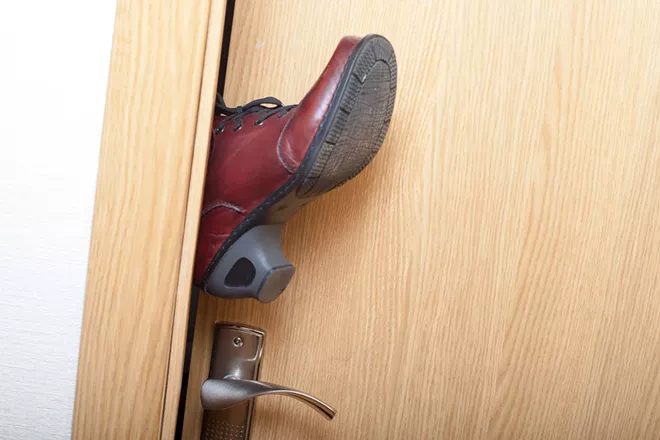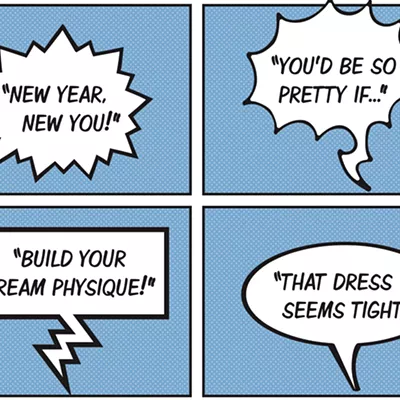"They'll take away my scholarship," the student said when I told her she needed to spend more time on her schoolwork. In her voice was something I had heard before. She told me she was afraid she wouldn't be able to finish her degree if she didn't say yes to yet another one of their opportunities.
"You know how it is," she said, "if you don't keep the door open, they'll close it for good."
I do know. And I know "for good" means exactly what it sounds like. In my last job interview, a white woman asked, "You have your fingers in a lot of pies. What will you give up if you are offered this job." Jokingly, I replied, "Housework," because I feared that had I told the truth, if I had corrected her and said it wasn't fingers despoiling pies, but feet propping open doors, that I wouldn't get a chance at the job — another door closed. And not just to me but possibly to any "good" that I may be able to do for others behind that door. I stayed angry at that question and found myself avoiding the woman who asked it, even after I got the job.
But the thing is not the door, of course, nor the key that unlocks it, but the hand that penned quotes like, "When one door closes another door opens," "Opportunity is knocking..." or "Knock, and the door will be open to you." Inspirational, undoubtedly, in that pull-yourself-up-by-the-bootstraps kind of way offered to Americans born with that silver key in their hand, whose teeth and notches fit precisely those locks made by the dominant culture. For those not born into the right socioeconomic status or ethnic group, getting that foot in the door is everything.
And opportunity does often lie behind a door. This is why the student was tired. She was presented with a multitude of opportunities. Opportunities to moderate panels, speak at conferences organized by non-Native professors, write essays for anthologies curated by non-Native editors, dance for white audiences, compose opinions about policy and show up for photoshoots directed by campus marketing. And because she wants to represent her tribe and educate others about Native issues, she does it, the extra work — and everything else expected of a university student — extra work that has put her far behind on her classwork.
And yet the opportunities keep coming, and she can't keep up. And when the doors are thrown wide open, the opportunities behind them look like precisely what they are, opportunities for the dominant culture. Opportunities that can be another form of oppression, that tend to benefit those giving them equally or more greatly than those for whom they are intended.
Because of this, I have realized that a foot in the door isn't enough. Recently, I facilitated a conversation leading to a substantial donation that would support bringing a Native student to a weeklong class. Months later, with a student in mind for the opportunity, I asked if the scholarship was available.
"We haven't figured out how to award it, so nothing is available this year."
I think this is where Audre Lorde, the poet, author and civil rights activist, would caution against using the master's tools to dismantle the master's house. To make sure that opportunities are indeed equal, we have to forget about finding the right keys or knocking on the right doors, but instead, start building establishments for the nondominant culture that are at the very least equitable and at their very best bastions of opportunity whose doors once opened never close and the only expectation for those who pass through is to leave the door unlocked for the next person.
And yet the opportunities keep coming, and she can't keep up. And when the doors are thrown wide open, the opportunities behind them look like precisely what they are, opportunities for the dominant culture.
It took restraint not to tell the student to simply say no to further opportunities. For as good as it sounds, it's not so simple. And though I understand the work of decolonization is not the job of those being colonized, I also know that there is no one more capable. And as much as I love the metaphor of doors and the ideas about this house we need to dismantle, I also see a deeper meaning in what Lorde said: It is not the master's tools, but the masters themselves who must dismantle the house. It is replacing the house with a community and the doors with people. People who open, who are opened by a new way of being, less interested in protecting what is behind the door with trials and expectations, and more interested in building an equitable community. And though I cautioned the student against taking too much on, I also understood.
"You all are always so busy," the same white woman who was at my interview said to me recently as we listened to a Black writer talk about his work and the many organizations he partnered with.
I now have the job and my fear of losing it has become less than my fear of closed doors. So this time, rather than making a joke or turning away, I opened up to my way of thinking about the work; I invited her to step into a new way of being together. ♦
CMarie Fuhrman is the associate director of the graduate program in creative writing at Western Colorado University, where she also directs the poetry program and teaches nature writing. She is the current Idaho Writer in Residence and author of the collection of poems, Camped Beneath the Dam, and co-editor of Cascadia Field Guide: Art, Ecology and Poetry. She resides in the mountains of West Central Idaho. Visit CMarieFuhrman.com.























